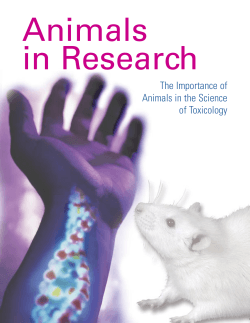
CTDC9 Flyer - International Union of Toxicology
ORGANIZATION Key Deadlines Abstract Submission Tuesday, 30th June 2015 Early Bird Registration Tuesday, 30th June 2015 Travel Award application deadline Monday, 31st, August, 2015 Further information www.cbtox.com.br secretaria@cbtox.com.br The International Union of Toxicology (IUTOX) and the Brazilian Society of Toxicology th (SBTOx) are pleased to announce the 9 Congress of Toxicology in Developing Countries (CTDC) and the XIX Brazilian Congress of Toxicology to be held in November 7th-10th, 2015, in Natal, Rio Grande do Norte, Brazil. Held every three years, the CTDC is sponsored by IUTOX. Its first version (at the time, not an IUTOX official meeting) was organized in Argentina by Dr. José Alberto Castro aiming to provide a forum for the discussion of toxicological problems faced by developing countries and exchanging knowledge with toxicologists from all over the world, especially from developing countries and regions. Other CTDCs were then organized worldwide in developing countries in Asia, South Africa and Europe (http://www.iutox.org). The Brazilian Congress of Toxicology is held every two years since 1981 and constitutes the most important meeting in Brazil comprising a broad program including all areas of toxicology. Last meetings gathered around 800 participants from all over the country and also from South America countries (http://www.sbtox.org.br). The idea of organizing both meetings together was approved by both IUTOX and SBTox General Assemblies. Although many toxicology meetings were held in Brazil with an international essence, this is the first time that the country hosts an international toxicology meeting covering all areas of toxicology. This is the biggest challenge of this meeting, gathering toxicologists from the different areas of toxicology, from clinical to experimental, from industry to regulators, from applied to basic sciences related to toxicology. The Scientific Committee organized a broad program that will cover the most relevant areas of toxicology to developing countries and Latin America region. Some topics include nanotoxicology, mode of action and risk assessment, forensic toxicology, developmental toxicology, in vitro toxicology and alternatives to animal experimentation, genotoxicology, and others. The Congress is arranged in lectures, symposia, commercial workshops, poster and oral presentations from Sunday to Tuesday. Continuing education courses will be provided on Saturday enabling undergraduate and graduate students to improve their knowledge in specific areas. Considering that this is an international meeting, the idiom will be English for the symposia, workshops and oral and poster presentations. Some continuing education courses will be provided in Portuguese. We count on your participation so that we can make this event memorable. Sincerely yours, Executive Committee PROGRAMME AT A GLANCE CONTINUING EDUCATION Scientific publication and peer review Toxicologia do Desenvolvimento e da Reprodução Fundamentos e aplicações da cromatografia gasosa acoplada espectrometria de massas (CG-EM) em Toxicologia analítica e Forense In silico and in vitro models in Developmental Toxiciology Epidemiologia aplicada a Toxicologia: delineamentos Bioinformática KEYNOTE LECTURES Relevance of Toxicology for Developing Countries future José Alberto Castro (Argentina) Chemicals Safety in Limbo: How low should we go? Linda Birnbaum , USA (Diretora NIEHS, USA) Analytical Toxicology Marcos Nogueira Eberlin, Brazil (UNICAMP, Brazil) Organs on a chip to be confirmed SYMPOSIA What is the question? Why are we testing for genetic toxicity and how does that affect the tests used? Analytical Toxicology Food Safety Issues New solutions for risk assessment of engineered nanomaterials Recent advances in Reproductive and Developmental Toxicology Genotoxicity and cytotoxicity exerted by emerging pollutants in developing countries Integration of mode-of-action data into the risk assessment of chemicals Environmental Risk Assessment Theories of addiction Should Azo dyes be considered as water emerging contaminants? Maternal-fetal Toxicity Drugs of abuse: mechanisms underlying addicition Mitochondrial Toxicity Metal Toxicity Alternative methods for skin sensitization Forensic Toxicology Toxicogenomics à
© Copyright 2025













